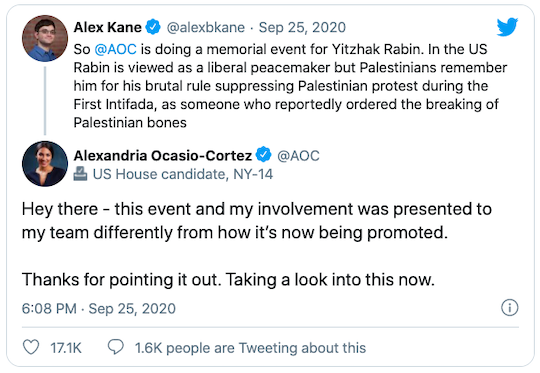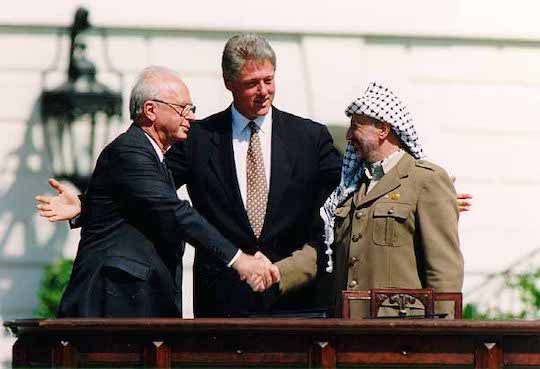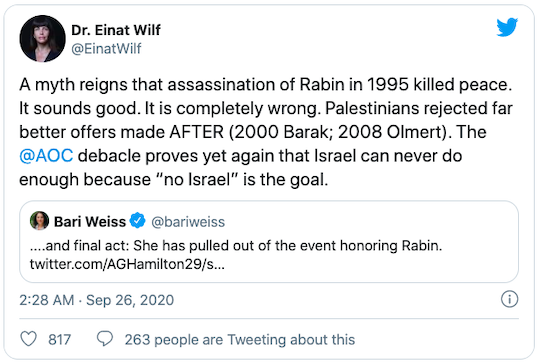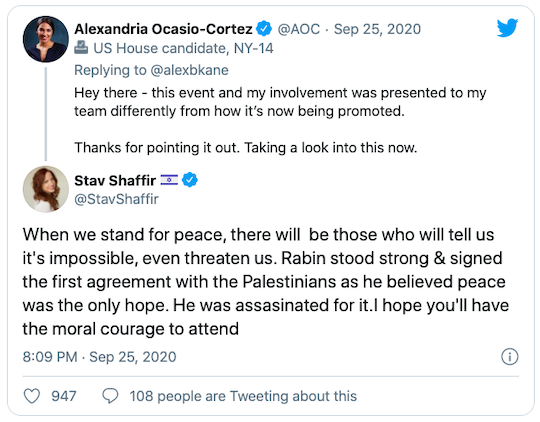
We’re Curious…
On September 24, the organization Americans for Peace Now (APN) announced that New York Congresswoman Alexandra Ocasio-Cortez would speak at their upcoming event commemorating former Israeli Prime Minister Yitzhak Rabin on the 25th anniversary of his assassination. The group said that Ocasio-Cortez would “reflect on fulfilling the courageous Israeli leader’s mission for peace and justice today in the US and Israel.”
The announcement signaled that the progressive lawmaker — who was one of four House Democrats who supported conditioning aid to Israel if it moved forward with annexation — might be willing to engage with the left-leaning, pro-Israel world, represented by organizations like APN. The group was established in 1981 to mobilize support for the Israeli peace movement, Shalom Achshav (“Peace Now”), and advocates for Israeli-Palestinian peace based on a two-state solution.
The announcement quickly sparked backlash from pro-Palestinian activists, many of whom said that Ocasio-Cortez should not commemorate Rabin because he expelled Arabs from their homes during the War of Independence in 1948 and called for brutal measures against Palestinian Arabs during the First Intifada.
Alex Kane, a Jewish freelance journalist, responded: “In the US, Rabin is viewed as a liberal peacemaker, but Palestinians remember him for his brutal rule suppressing Palestinian protest during the First Intifada, as someone who reportedly ordered the breaking of Palestinian bones.”

The next day, a spokesperson for Ocasio-Cortez confirmed that the congresswoman had withdrawn from the event. The congresswoman’s office reportedly did not realize that the event would be framed as a commemoration of Rabin.
The news that Ocasio-Cortez had canceled her participation was welcomed by some pro-Palestinian activists and groups. “[Rabin’s] legacy is one of violence and dispossession for Palestinians,” Adalah Justice Project said on Twitter. “Thank you AOC for listening to the lived experience of the Palestinian people.”
As Prime Minister, Rabin oversaw the initiation of the Oslo Process, a shaky peace proposal with Palestinian leader Yasser Arafat. He received a Nobel Peace Prize for his efforts, along with Shimon Peres, who was Israel’s Foreign Minister at the time, and Arafat.
On November 4, 1995, immediately following a peace rally in Tel Aviv, Rabin was assassinated by a Jewish extremist who disagreed with his involvement in the peace process, including his willingness to give up land to create a Palestinian state.
As some pro-Palestinian activists leveled harsh criticism against Rabin and his legacy, and as we approach the 25th anniversary of his death, we felt it was important to delve into his story.
Who was Yitzhak Rabin and what is his legacy about? Why would Ocasio-Cortez withdraw from an event honoring Rabin, who many Israelis remember as the face of the peace movement?
And why does her decision and this conversation matter, not only to Israelis and the Jewish community, but to everyone?
Yitzhak Rabin’s Life and Legacy
Born in Jerusalem in 1922, Rabin first became known for his military achievements. In the 1948 War of Independence, Rabin directed Israeli operations in Jerusalem and fought against the Egyptian forces in the Negev. In the Six-Day War, Rabin helped mastermind the legendary, preemptive strike that crippled Egyptian air bases and led to Israel’s victory.
On June 3, 1974, after serving as Israel’s ambassador to the United States, Rabin made history as Israel’s first prime minister who was born in the land of Israel. During his first term in office, he oversaw Operation Thunderbolt (also known as Operation Entebbe), the miraculous rescue of hostages held in Entebbe airport in Uganda.
During the First Intifada, Rabin, who was serving as Defense Minister, was accused of ordering Israeli soldiers to “break the bones” of violent Palestinian rioters. According to Israeli historian Anita Shapira, it is doubtful that Rabin ever said this, but it is certainly the way Israeli troops understood his directives in response to Palestinians, who were throwing stones and molotov cocktails.
During his second term as Prime Minister, which began in 1992, Rabin — who had been involved in so much military conflict — appeared to have a singular mission: peace. Rabin and Israel’s Foreign Minister, Shimon Peres, oversaw the initiation of the Oslo peace process with Palestinian leader Yasser Arafat.
The Oslo process reached a climax in September 1993. With cameras clicking, Rabin shook hands with Arafat on the White House lawn, with President Bill Clinton looking on. Some reporters described Rabin’s awkwardness, captured in photographs, as a reluctant groom about to say “I do.”
While speaking the language of peace in English, Arafat would call for “jihad to liberate Jerusalem” in fiery Arabic speeches. During this time, Palestinian terror attacks, especially suicide bombings, were pervasive in Israel. For all of Rabin’s understandable doubts, the prospect of peace between Israelis and Palestinians still appeared to be a real possibility.

But back in Israel, terrorism had been draining support for the peace process. A major rally was organized with the goal of elevating the voice of the “peace camp” and reinvigorating the cause.
On the evening of November 4, 1995, Rabin arrived to a crowd of 100,000 people standing in Kings of Israel Square (later renamed Rabin Square) in Tel Aviv. When he stepped up to the podium to speak, the crowd was chanting “Rabin, king of Israel.”
More powerful than his usual monotone, Rabin declared: “I was a military man for 27 years. I fought as long as there was no chance for peace. I believe there is a chance now, a great chance, and we must take advantage of it.”
Foreign Minister Shimon Peres said that it was the happiest he had ever seen Rabin. The crowd sang Shir L’Shalom (the song for peace) as the rally ended. Rabin placed the lyrics of the song into his jacket pocket, and, surrounded by his security guards, walked down the stairs toward his car through cheering supporters when suddenly Israeli history changed forever. Yigal Amir, a Jewish extremist, walked up to Rabin and fired three bullets towards him.
Within 40 minutes, standing outside the hospital, Rabin’s bureau chief Eitan Haber announced that the prime minister was dead.
Amir, a young Orthodox law student, believed that because Rabin was negotiating with Arafat — the mastermind behind countless terrorist attacks against Israelis — the prime minister meant the Jews harm. Amir was sentenced to life in prison after trying to make the argument in court that the assassination was in accordance with Jewish law.
Rabin’s assassination led to deep rifts in Israeli society — between the right and the left, as well as between religious and secular Israelis — that persist to this day. To be sure, if you were to walk the streets of Israel and ask about Rabin, you would hear a range of perspectives. But similar to John F. Kennedy’s assassination and the events of 9/11, every Israeli citizen who was more than a few years old at the time remembers where they were when they heard the news that Rabin had been killed.
Rabin was both a war hero and a peacemaking icon, receiving the Nobel Peace Prize for his efforts. He was hawkish in ordering the expulsion of 50,000 Arab inhabitants in Lydda and Ramla during the 1948 War of Independence and dovish in pursuing peace with the Palestinians. Though he was socially awkward and introverted, he was also a dignified international statesman who is credited with engineering some of Israel’s boldest geopolitical decisions.
Both revered and reviled by Israelis over his involvement in the Oslo process, Rabin was a real person and a complicated figure. He evolved over time and adapted to different political eras as someone who was willing to learn, change, and grow.
Reactions From Israeli Leaders and Commentators
Many Israeli leaders and commentators expressed disappointment over Ocasio-Cortez’s withdrawal from the event.
Brian Reeves, a spokesperson for Peace Now, the sister organization of Americans for Peace Now, asked the congresswoman to take a closer look at the two groups’ social media accounts. “Are you really going to boycott us and all our work with Palestinians to support human rights and an end to the conflict, just because Rabin wasn’t a flawless idle [sic] after 5 decades of conflict?” he said on Twitter.
Einat Wilf, a former Knesset Member and co-author of “The War of Return,” wrote that Ocasio-Cortez’s decision sends a message to Israelis that for those who oppose the existence of a Jewish State, Israelis will never be enough. “The AOC debacle proves yet again that Israel can never do enough because ‘no Israel’ is the goal,” she said.

Stav Shaffir, a former Knesset Member in the center-left Labor Party, urged Ocasio-Cortez to reconsider her decision. “Rabin stood strong & signed the first agreement with the Palestinians as he believed peace was the only hope,” she said. “He was assassinated for it. I hope you’ll have the moral courage to attend.”

Noa Rothman, Rabin’s granddaughter, responded to Ocasio-Cortez by citing one of her grandfather’s famous sayings: “You make peace with your enemies- not with your friends. Due to [Rabin’s] brave historical act he was assassinated. But of course populism is easier.”
In a piece responding to the events, Amir Tibon of Haaretz concluded: “The members of the Squad, it’s time to admit, simply don’t want to be friends with [the liberal Zionist] segment of the Jewish community,” referring to a group of four progressive congresswomen led by Ocasio-Cortez. He urged liberal Jewish Zionists to “focus on political leaders who actually want to be friends with” them and who are committed to a two-state solution.
Reactions From the American Jewish World
American Jewish leaders and organizations from across the political spectrum also criticized Ocasio-Cortez’s decision.
J-Street president Jeremy Ben-Ami wrote in a blog post that “the balance sheet of a lifetime spent defending one’s country and protecting one’s citizens is unlikely to be pure.” Rabin, like other leaders, has made mistakes, “including the fact that he was the commander who opened fire on my father and his comrades on the Altalena in 1948.” Still, Ben-Ami argued, we should honor his legacy because he made a transition from “warrior” to “peacemaker.”
The Zioness Movement, a progressive Zionist coalition of Jewish activists, wrote in an open letter to Ocasio-Cortez that her decision would not help Palestinians or promote peace, but that instead, “It will advance the feeling of despair held by so many progressive American Jews who feel abandoned by our fellow justice-seekers. And it will dehumanize Israelis, and signal to others that there are no Israelis worthy of celebration — not even a Nobel Prize winner who literally gave his life for peace.”
Michael Koplow, policy director of the Israel Policy Forum, argued, “There is no such thing as a peacemaker without war” or “peace without complexity and compromise.” He added: “If you can’t recognize and honor the Israeli PM who recognized the PLO, ceded Israeli sovereignty for the first time in parts of the West Bank, and signed a peace treaty with Jordan, and was then killed for it, then there is not one Israeli leader who has ever met your standard.”
The American Jewish Congress said in a statement, “We must not cancel Yitzhak Rabin,” and expressed concern that the event “has been dragged into the cancel culture that plagues our current politics.” They added that Ocasio-Cortez “has distanced herself from the principle of supporting those who seek engagement to foster peace.”
The Bottom Line
Ocasio-Cortez canceled her participation in an event commemorating Yitzhak Rabin after facing backlash from pro-Palestinian activists. As many American Jewish and Israeli leaders have suggested, her decision sends the message that if Rabin — the Nobel Prize winner who paid the ultimate price for his peace efforts — is not “enough,” then Israel is being judged by some progressives according to standards that are impossible to meet. Like other great leaders, Rabin’s life was complex, and we can and should acknowledge both his successes and failures. At the same time, there is no doubt that Rabin’s legacy of physical, political and moral courage — and his efforts to achieve peace — should continue to be celebrated.
Originally Published Oct 5, 2020 03:34PM EDT
